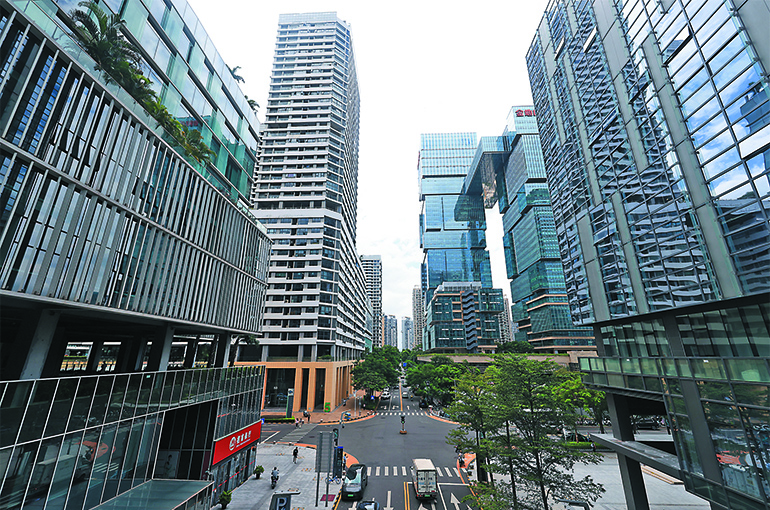 Cross Boarder E-Commerce Merchants Boost Office, Warehouse Demand in South China
Cross Boarder E-Commerce Merchants Boost Office, Warehouse Demand in South China(Yicai) Feb. 5 -- Cross-border e-commerce sellers are bringing hope to southern China's office and warehouse leasing markets amid a sluggish nationwide trend.
Warehouse vacancy rates fell to single digits in five southern cities last year, according to data from Chicago-based Jones Lang LaSalle.
Office projects in selected areas are experiencing high demand. Shenzhen's Bantian, a suburban area of the southeastern tech hub, has seen strong demand for office space due to numerous cross-border e-commerce businesses, according to American property services firm Cushman & Wakefield. This contrasts with premium office buildings in Shenzhen as a whole, which reached a vacancy rate of 26.6 percent last year.
For instance, Bantian's Galaxy World project, with a total office space of around 750,000 square meters, maintained about 96 percent occupancy last year. The medium-range offices achieved a net absorption area exceeding 170,000 sqm, surpassing the city's average of 120,000 sqm for premium offices, indicating faster new contract signing compared to space vacancies.
Nearly 50 percent of Galaxy World's new office leasing clients last year were cross-border e-commerce companies, Huang Shuli, head of corporate services for South China at Cushman & Wakefield, told Yicai.
An international business division of a certain e-commerce platform rented an entire floor in Shenzhen's Qianhai area a year and a half ago and is now planning to expand its office space to around 20,000 sqm, Li Wenjie, department director for West and South China at JLL, told Yicai.
Warehouse Demand
Southern China's warehouses and logistics parks are also experiencing rapid growth in demand.
The non-bonded warehousing and logistics markets in five southern cities - Guangzhou, Shenzhen, Dongguan, Foshan, and Huizhou - recorded a combined net absorption area of over two million square meters for the second consecutive year last year, driven by booming cross-border e-commerce while demand from traditional industries remained low, according to JLL.
Fueled by steady demand from cross-border e-commerce companies, the vacancy rate of non-bonded logistics warehouses - facilities for post-tax storage - in these five cities has stayed between 3 and 7.5 percent, JLL data show.
Cross-border e-commerce companies claimed almost all of the newly added warehouse space - around 2.1 million sqm - in the five cities last year, and the sector now accounts for about 35 percent of total warehousing demand, said Yang Jinyi, director of industrial and logistics services at JLL Guangzhou.
For instance, a 420,000-sqm warehouse park launched by Global Logistic Properties in Qingyuan, Guangdong province, last year was fully leased by a leading cross-border e-commerce company. Similarly, another 270,000-sqm park that GLP opened in Dongguan in 2023 also lists cross-border e-commerce companies as key tenants.
Yang from JLL predicted that cross border online merchants will continue to drive warehouse leasing demand growth over the next two years.
Editors: Tang Shihua, Emmi Laine